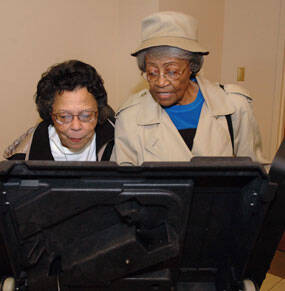Free and fair elections, a marvel that citizens of mature democracies can too easily take for granted, are still uncommon in our world. Despite the long primary races and an equally long general election campaign, the U.S. presidential election generated enormous popular interest. We have seen increased voter registration, lines at early voting stations, young people becoming involved in politics for the first time and creative fundraising. World citizens also have expressed overwhelming interest in this presidential race. Will American citizens see this election as one step in their ongoing participation in self-government, or will they consider it a “mission accomplished” and leave governing up to the new president and Congress? In this time of financial uncertainty, growing unemployment and involvement in two wars, what can Americans do for their country?
It takes more than casting a vote. Although there can be no democracy without elections, what elections can accomplish is limited. A winner can prove ineffectual or misguided. An elected leader can even use democracy to establish a dictatorship, as happened in Germany under Hitler. Electing a strong leader is not all a democracy needs. If the transference of power every few years without violence does not sustain a democracy, what does make it work? Under-standing, vigilance and activism on the part of citizens.
Understanding. Citizens must understand how their government works and their role in it. Democracy depends on an effective and cautious governing system, like the checks and balances on power set up in our Constitution and Bill of Rights, with a separate judiciary, legislature and executive branch designed to prevent one branch from exerting excessive power, and with military and police under civilian control. Democracies must guarantee specific freedoms (of the press, association, worship and so on), levy taxes and perform public works—infrastructure, social welfare and security.
Once such a system is in place, citizens keep a democracy going. Citizens turn what is essentially a proposal on paper into a living, breathing reality. It seems counterintuitive that a democratic government in which power is decentralized—like a table upheld by a million legs—is inherently fragile. Yet for self-government to succeed, every new generation must take up the cause. If it does not, the democracy can be thrown off balance, or fall into the grip of a powerful few, or become captive to a majority whose treatment of minorities mocks democratic principles, or become isolated from the rest of the world. What makes a democracy work are citizens who know that at its heart democracy is about securing liberties that promote the common good, and who take the initiative to achieve that goal.
Vigilance. Good citizens are vigilant, aware of governmental and societal trends and continually trying to educate themselves about current events. Citizens must know their rights and insist upon them, while also performing their civic duties. Good citizenship means looking intently beyond one’s own personal interests to protect the rights of others. In Christian parlance, it means looking after the stranger, the poor, the imprisoned, whoever is “the least,” an attitude with crucial civic consequences beyond its religious meaning.
Activism. Democracy thrives when citizens are active participants, engaged in expressing their will through public discourse and at work to bring about their hopes through voluntary associations, like churches, unions and a host of other civic groups. Civic involvement takes on many forms, including participation in watchdog groups and politically motivated organizations. Such affiliations can build social networks and the habits of participation and vigilance that a democracy needs to succeed. Groups that serve the poor, educate children, develop consciences, discuss social concerns and perform a wide range of charitable actions strengthen a democracy.
The task before the American people now is to sustain the citizen interest evident during the 2008 election. It is tempting for a voter whose candidate does not win an election to give up and drop out, or for a winner’s supporters to sit back as though the hard work of governing does not involve them. Apathy is the great enemy of democracy.
There are many causes for concern. Developments over the past eight years, for example, have greatly expanded executive authority, pushing our government off balance to a degree not seen for generations. This situation will not correct itself; lobbyists and others with an interest in making the imbalance permanent are working toward that end. Our new president holds more power than any of his predecessors in the last six decades. It is up to ordinary citizens to ensure that he uses it wisely, that our democracy upholds the shared ideals of its citizens and founders and that our political system is restored to health.








